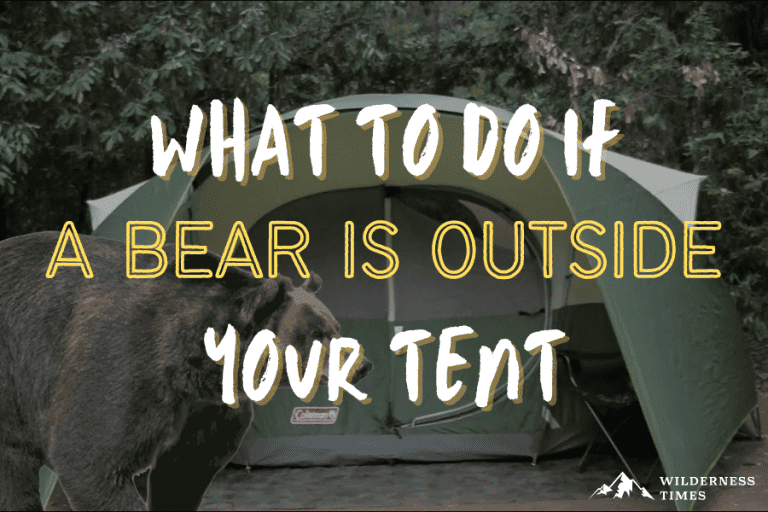Bears are all over North America. So, if you’re someone who likes to go outdoors, you’ll likely need to know what to do if a bear is outside your tent.
These deceptively cute animals can be attracted to improperly stored or left-out food.
In some cases, they might explore your campsite at night – while you’re inside your tent.
In this article, we’ll dive into what to do if you suspect a bear is outside of your tent.
Plus, we’ll go over a few measures you can take to prevent bears from wandering into your campsite in the first place.
Table of Contents
ToggleSome Things You Can Do
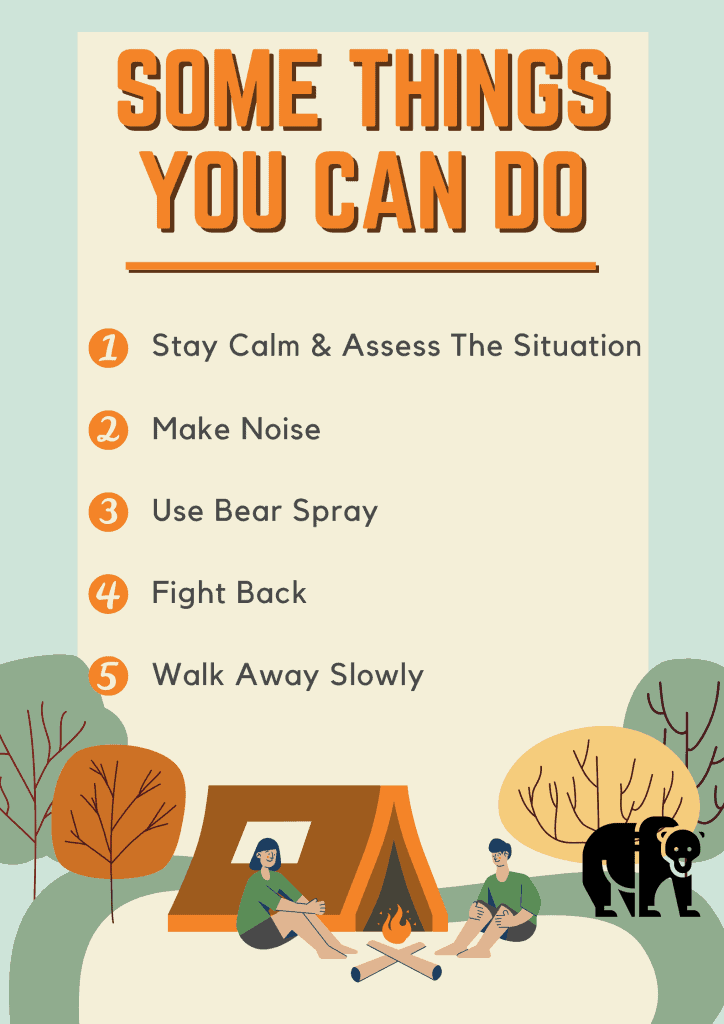
If you’re inside your tent when a bear wanders into your campsite, you’ll likely be able to hear and smell them.
When this happens, stay calm, make noise, and get ready to use bear spray if needed.
Below are a few approaches to take when you suspect bear activity.
In general, it’s best to start with low intervention methods and increase your activity in accordance with the bear’s escalation.
Also Read: Pepper Spray vs. Bear Spray (Which is Better?)
Stay Calm & Assess The Situation
If you suspect a bear is in your campsite while you are in your tent, it’s best to stay calm and quiet.
It’s likely that the bear is just passing through your campsite to look for food – not for you.
In the majority of cases, the bear will pass through your campsite without bothering any tent structures.
Staying quiet will ensure that they will just continue on with their night without causing any ruckus.
Make Noise
If the bear does start to get closer to the tent area of the campsite, it’s time to make yourself known by making noises.
In most cases, bears are afraid of humans. So, hearing humans or human-produced noises around them in the tents can ward them away.
When using your voice to ward away a bear, make yourself sound loud and monotone.
The goal is to sound like a loud human, not like another type of animal or bear.
You can also hit pots and pans together to make even louder noises.
Stay away from any high-pitched sounds that could be mistaken as prey.
Low noises could also be mistaken as another bear.
In most cases, making yourself known to the bear through loud noises will ward them away from your campsite.
Also Read: Bear Necessities: The Ultimate Guide to Camping in Bear Country
Use Bear Spray
If the bear continues to approach your tent even after you’ve made yourself known, it’s time to use some increased defensive methods.
Bear spray contains capsaicin – the ingredient in hot chili peppers that makes them spicy.
When it is sprayed at a bear, it overwhelms their senses and causes pain in their eyes and nose.
Once it’s sprayed in their direction, bears will likely run away.
Even though bear spray is advertised as for bears, it can hurt any living being around it.
Therefore, there are two important aspects to remember when employing it in defense:
#1. If you’re in the tent when you need to use bear spray, make sure you spray it outside of the vestibule.
You want to prevent any bear spray particles from getting stuck inside the structure – and affecting you and your tent mates.
#2. Make sure that you are upwind when spraying the bear spray, and that the bear is downwind from you.
You want to make sure that none of the particles will blow away from the bear and into your face.
Fight Back
If the bear is aggressively entering your tent and bear spray isn’t scaring it away, it’s time to fight back.
Start hitting and yelling loudly.
When you fight, try to use large objects to hit the bear in sensitive spots, like its eyes or ears.
Usually, just yelling and hitting close to a bear has scared them away from tents they’re getting too close to.
Read: How To Protect Yourself From Bears (SAFETY Tips)
Walk Away Slowly
When dealing with bears, never run away from them!
Running, or any other fast movements, can trigger their prey drive and cause them to run towards you.
As a rule, bears can run much faster than humans. They can get up to 30–40 mph, while we can only reach 8–10 mph. You will lose if you try to run away.
Depending on the bear, it’s always better to stand your ground or play dead when a bear charges you.
If you find a bear in your path, there are two main approaches:
#1. Get big and stay in one place. Then, make large, slow movements and loud noises.
This way, the bear will view you as a threat and know where you are – and how to avoid you.
#2. If you absolutely need to move out of the way, use slow, sideways movements.
Bears don’t immediately register sideways movements as threats, so this can be a viable option for getting out of their path.
Types Of Bears & Their Behaviors
The two main types of bears in North America are Black Bears (Ursus americanus) and Grizzly Bears (Ursus arctos horribilis).
Between the two of them, they have quite a few differences. We’ll go over those differences in the section below.
Black Bears
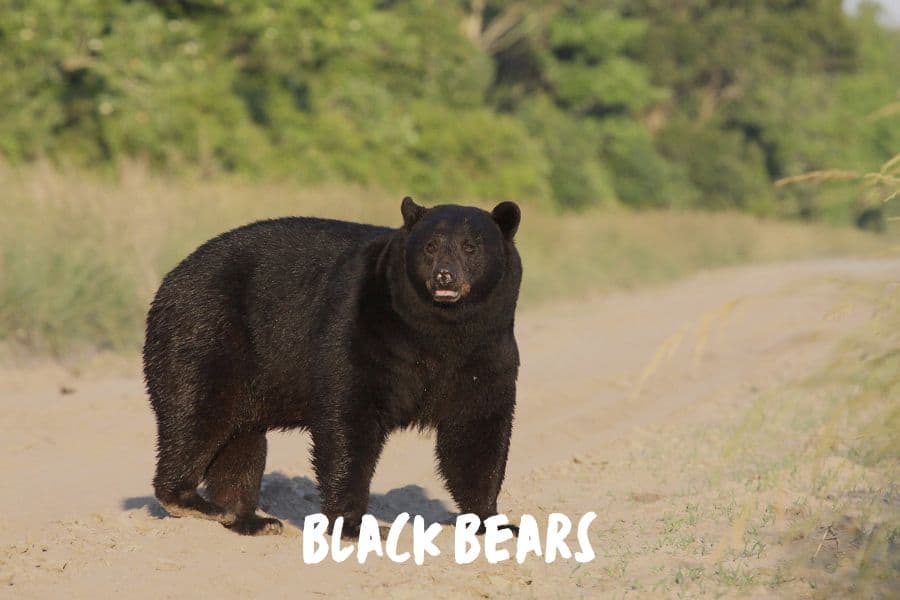
Black bears live throughout most of North America.
Their coats can range in color from black and brown to reddish and even blonde.
Importantly, not all black bears have black coats!
Black bears have evolved and are most likely to live in areas that are heavily wooded.
Their first reaction to potential threats is usually to run away or hide under the shelter of the forest.
They are fantastic climbers and will usually flee upwards into trees when they perceive threats.
Although they are powerful creatures, this tendency to run away makes them less of a threat to campers.
It’s unlikely, but if a Black bear is extremely threatened or suffering from starvation, they can act aggressively.
They may not respond with fear to your preventative actions (like getting big and loud).
If you find yourself on the other end of an aggressive black bear, fight back.
Hit, kick, and scream as much as you can, and aim for sensitive areas like the eyes and ears.
Grizzly Bears
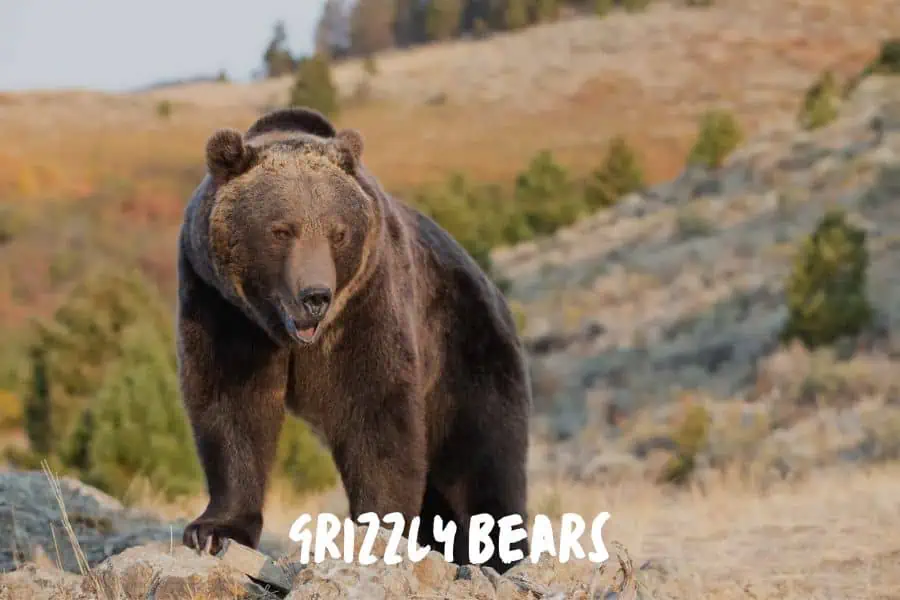
Grizzly Bears – colloquially known as “brown bears” – live throughout the northern portion of the United States, as well as portions of Alaska and Canada.
Although their coats are usually brown with white on the edges (causing their “grizzled” description), these bears can range in color from tan to dark brown.
In general, grizzlies are larger than black bears. However, in some cases, juvenile grizzly bears can resemble full-sized black bears.
Grizzly bears evolved and live in areas with little-to-no tree coverage.
Because of this, they are much more aggressive than black bears because they don’t have anywhere to hide when they perceive a threat.
If you are attacked by a grizzly or brown bear, play dead.
Lay on your stomach with your pack on your back, your hands around the back of your neck, and your legs spread as wide as possible.
This will keep your body protected and lessen the likelihood that the bear can flip you over.
How To Prevent A Bear From Investigating Your Tent
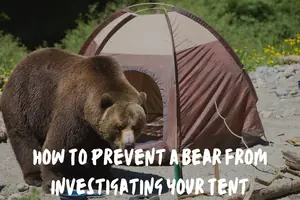
Secure Your Food & Attractants
The best way to prevent a bear from coming to your campsite is to ensure there’s nothing to attract them there in the first place.
Using bear bags or bear-safe food-securing methods is a great way to ensure there’s nothing for them to find.
Bear Bags
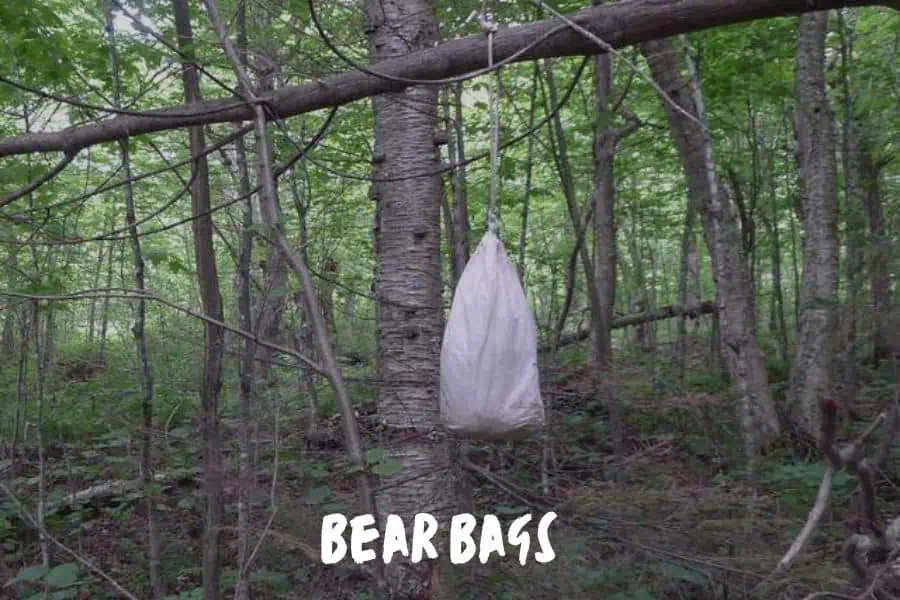
Bear bags are my go-to method when I’m in bear country because they keep food secured and off the ground.
When they’re looking for food, bears are going to follow the path of least resistance.
If you make it difficult for them to reach your food, they’ll move on.
You just fill your bear bags with your food supplies and string them up between a few branches – out of reach for any wandering bears.
The pros of this approach far outweigh any cons. The materials are fairly light, so can be brought on longer treks with no weight issue.
This method also keeps your food and supply out of wandering bears’ reach, so they’re more likely to move on faster.
Watch the video below to learn more about this technique.
Bear Canisters
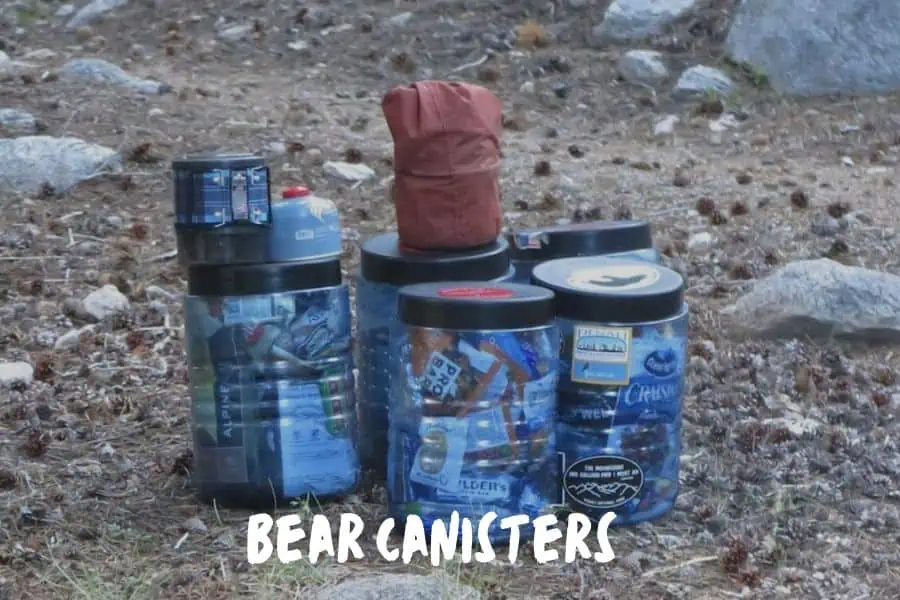
Bear canisters are bear-safe containers that you seal with food inside and place among rocks or brush at least 100 feet from the campsite.
Bears are unable to open these containers and will be deterred once they experience difficulty with them.
These can be good options if you’re car camping, since they are fairly heavy and bulky.
However, these are not always my first choice because they are still usually placed in an area that the bear can reach.
This means that bear containers could still attract a bear to an area near the campsite and engage it as it tries to open the container.
Bear Coolers
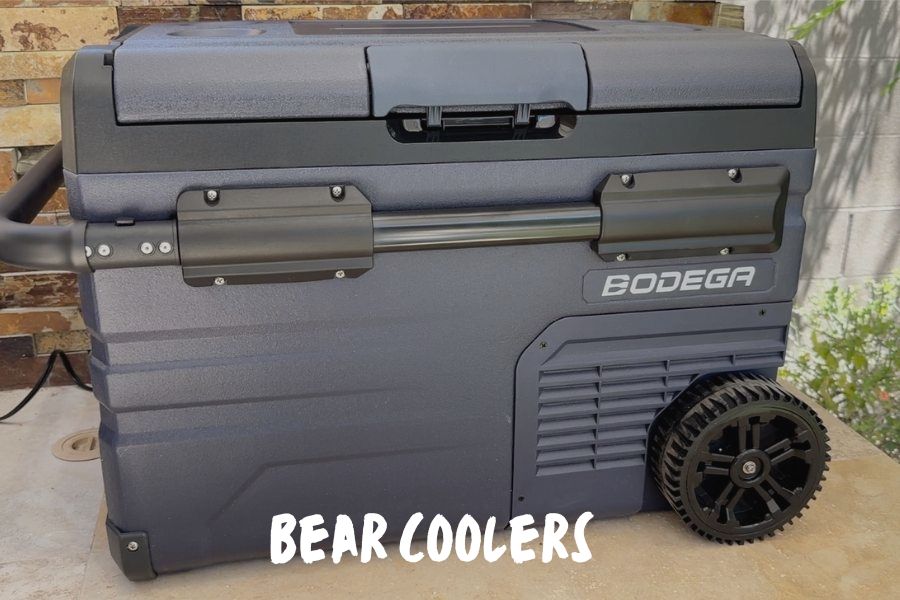
Similar to bear canisters, bear coolers are large coolers that have bear-safe closing mechanisms.
They are usually placed on the ground at least 100 feet away from the campsite.
Also, something to note: most coolers still need a padlock or extra reinforcement to be truly “bear-proof”.
This is because bear coolers are a newer technology. Not all national parks or woods allow them in the area.
Make sure you check with local regulations if you plan on bringing one.
Additionally, if you decide to use a bear cooler, make sure you get one that has been certified by the Interagency Grizzly Bear Committee (IGBC).
This means they have been tested against live bears to ensure effectiveness.
Pitch The Tent Away From Your Food Area

When setting up your campsite, it’s important to follow the “bearmuda triangle” set-up method.
This will make sure that you’re setting up your tents at least 200 feet away from both the bear bag area and the campfire area.
Once you’re done, these three spaces will form a triangle throughout your campsite.
Wear Specific Sleep Clothes
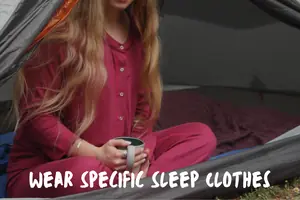
To prevent the bear from coming close to your tent, you want to make sure that there are no potential food smells in the tent itself.
Remember, bears follow their nose more than anything.
This includes changing into sleep-specific clothing. You should never sleep in the clothing you were wearing when you were cooking or eating food.
This also prevents you from accidentally bringing any forgotten wrappers into the tent in your pockets.
Changing ensures that any potential food smells are kept out of the tent so bears will have no reason to explore your tent area in search of food.
Ditch The Deodorant

In addition to ensuring you don’t smell like food, it’s also important to make sure you do smell like a human.
While it might take a little bit of getting used to, one of the best ways to do this is to forego deodorant while in bear country.
Bears are scared of humans, so smelling like one is a great deterrent.
This way, if a bear comes through your campsite, they’ll be able to distinguish where the food is and where the humans are.
This same logic applies to scented lotions, perfumes, or hand sanitizers.
Bears have great noses, but they aren’t great at distinguishing between food smells and artificial smells in scented products.
Other Tips & Tricks For Bear-Safe Camping
Make Consistent Noise

One of the best ways to keep bears away from you in bear country is by making enough sound that they can hear you coming and proactively get out of the way.
Coming up on a bear with no warning can startle or scare the bear and make them automatically defensive
There are multiple ways to make noise, like talking with others, yelling out occasionally, or wearing bear bells on the trail.
All of these methods have one goal in mind: be loud!
Take A Buddy
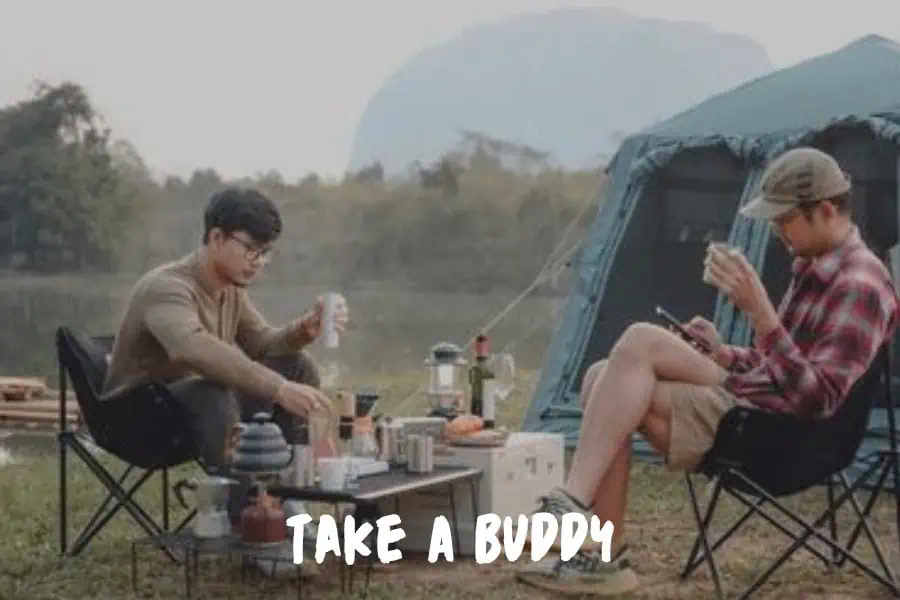
The more people are in your hiking or camping party, the louder (and smellier) you’ll be.
This will make it even easier for any bears in the area to know where you are and avoid you.
Use An Air Horn

If you’re worried about dangerous wildlife, you can always bring an air horn with you on the trail.
In addition to scaring away bears, this can also be a helpful tool if anyone in your group gets lost and needs to communicate their whereabouts.
Create Light Or Fire
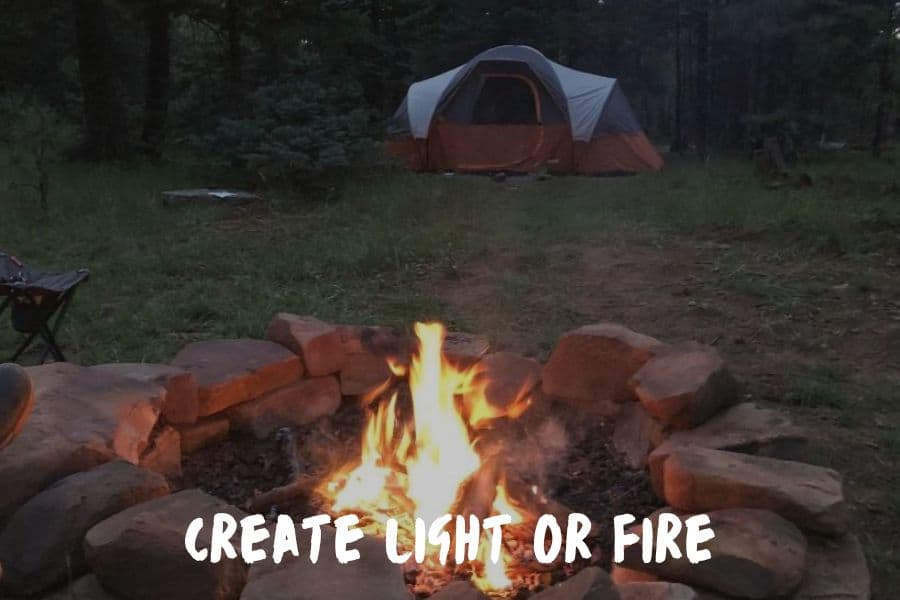
Like most animals, bears will stay away from fire and other light sources at night time.
If you are especially worried about curious bears in your campsite, you can build a fire to last throughout the night or keep a lantern/light on.
Never Get Between Mom & Baby
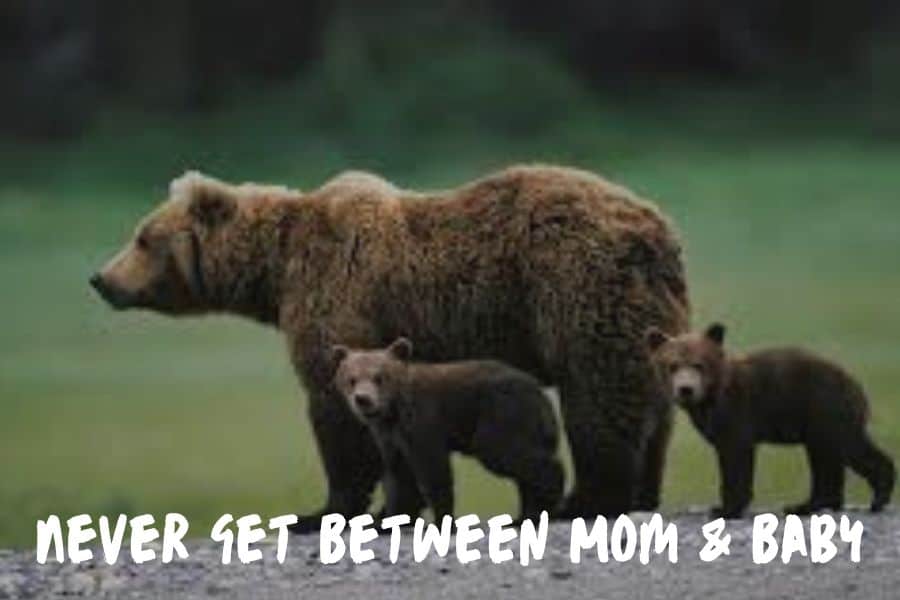
Mother bears are known for being protective of their offspring.
If you see a bear cub in the woods, it’s likely its mother is nearby – and will get angry if you’re close to her cub.
Although it might be by accident, if you spot a bear cub or a mother with her cubs, try to stay as far away as possible.
Defending their offspring is one of the main reasons bears get aggressive with humans.
Never Feed A Bear
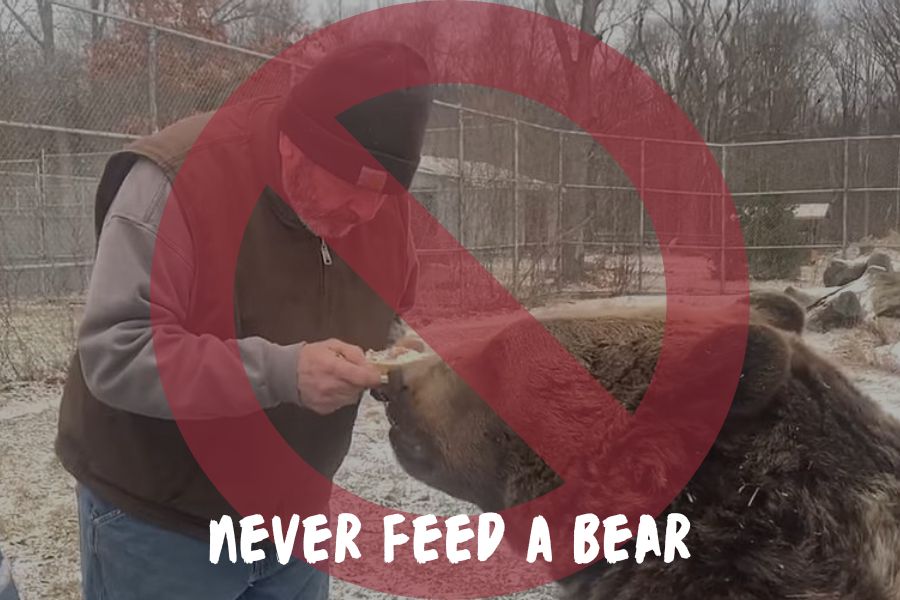
Even though it can be tempting, never feed a bear that wanders into your campsite.
Bears want to follow the path of least resistance when it comes to finding food.
Once a bear knows it can get food relatively easily from humans, it will become reliant on this process – and will begin to frequent camping spots.
Once a bear knows it has gotten food from campsites in the past, it can get more aggressive with people and spaces there.
This could even lead to future harm to campers. Such behavior might even cause the bear to be removed from the area and humanely euthanized in extreme cases.
What To Do Once The Bear Leaves
If a bear just wandered through your campsite and left after your deterrent measures, you shouldn’t have to worry about the bear coming back.
It’s likely learned that there are humans there, and won’t come back until you have left.
In all cases, make sure that you are extra careful about securing your food throughout the rest of the campsite.
You don’t want to give the bear an additional reason to head back your way.
If the bear was aggressive towards you, it’s best to report its behavior and last known location to the park ranger or park authorities.
Parks usually track bear-human interactions.
They can then make the decision to continue tracking the bear, or humanely euthanize it to prevent any potential future harm.
FAQs
Will Playing Dead Work If A Bear Is Outside My Tent?
Playing dead is the go-to method if you encounter a grizzly bear on the trail.
If you’re in the tent, it’s best to stay quiet and still until the bear starts to get too close to the tent.
If the bear is too close to the tent, the best approach is to start making noise to scare it away, then escalate to using bear spray.
How Do I Differentiate Between A Black Bear & A Grizzly Bear?
It’s important to understand that you can’t always tell the difference between the two types of bears based on their size or color.
Despite that, there are a few main ways to distinguish between black and grizzly bears.
The first is by their faces and snouts. Black bears have a straighter nose, while grizzlies’ noses have a more concave shape.
In addition, grizzlies’ eyes are closer together and more deep-set into their skull.
Additionally, grizzlies’ ears are small and round, while a black bear’s ears will be larger and fan out more from their head.
Lastly, grizzlies have a large hump of muscle on their shoulder area.
This muscle helps them lift rocks and dig through other environments to find food. Black bears do not have this same hump on their backs.
You can visit this site to find more information on the two types of bears.
Should I Confront The Bear If It Shows Aggression?
You should never confront an aggressive bear. Doing so can increase its aggressiveness and potentially encourage an attack.
When dealing with bears, it’s important to only escalate the scenario if you see rising aggression from the bear themselves.
In other words, react to their aggression, don’t cause any more of it.
Can I Use Firearms To Scare Away A Bear Outside My Tent?
Technically, yes you can. If you’re planning to bring a firearm to protect yourself against bears, make sure you have the right ammo for a bear.
Also make sure to use all safety measures associated with the equipment.
If you bring the wrong bullet size, or hit the wrong part of the bear, you’re likely to trigger an attack reaction from the bear.
In addition, some outdoors sources will recommend that you shoot the bear from inside the tent.
We do not recommend this approach since this can be extremely dangerous and has resulted in injury and death of other campers.
If you are in a situation where you feel you must use a firearm to shoot an animal on the outside of your tent, use a knife to create a small sight hole in your tent to ensure the creature outside the tent is in fact a bear.
What If I Have No Access To Bear Deterrent Tools?
If you have no access to bear deterrent tools, like bear bags or bear spray, I recommend you hold off on your campout until you can find some.
The good news is that these tools are fairly easy to get at your local outdoors store, so you shouldn’t be delayed for long!
How Long Should I Wait Inside My Tent Before Taking Action?
If the bear is just walking through your campsite and is not approaching the tents, it’s best to stay quiet and still in your tent.
It’s time to start taking action by making noise when the bear seems to be approaching the tent.
No matter what, trust your instincts. If you feel unsafe waiting for a bear to get closer, start making noise.
To Sum Things Up
When it comes to bears approaching your campsite, the best thing to remember is that they are afraid of you.
More often than not, bear encounters are harmless and uneventful.
Being outdoors means you’re in their space, and if they happen upon you, it doesn’t automatically mean the encounter will be aggressive.
Plus, if you follow our recommendations for bear-proofing your campsite, then the chances of a bear wandering into your space are very low.
At the end of the day, just remember to let them be, and when you feel the need, make plenty of noise to let them know you’re there.
Happy camping!
Interested In More About Bears & Camping? Read More Below!


